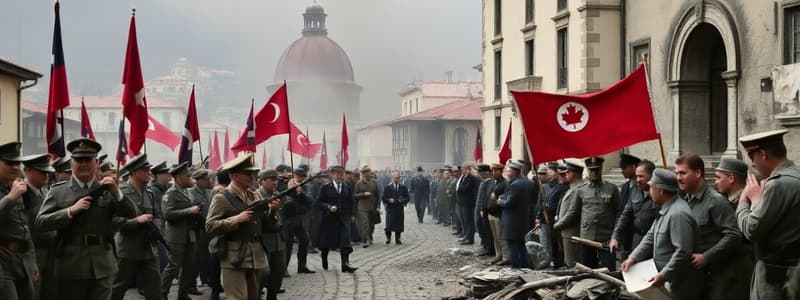Podcast
Questions and Answers
What event triggered the series of actions that led to the outbreak of World War I?
What event triggered the series of actions that led to the outbreak of World War I?
- The Balkan Wars
- The mobilization of troops
- The bombarding of Belgrade
- The assassination of Archduke Franz Ferdinand (correct)
Which group was responsible for the assassination of Archduke Franz Ferdinand?
Which group was responsible for the assassination of Archduke Franz Ferdinand?
- The Black Hand (correct)
- Austrian nationalists
- The Bolsheviks
- Militarists of Serbia
How did the system of alliances contribute to the onset of World War I?
How did the system of alliances contribute to the onset of World War I?
- It ensured peace among major powers.
- It caused nations to become isolationist.
- It facilitated economic cooperation.
- It escalated conflicts between allied nations. (correct)
What role did imperialism play in the events leading up to World War I?
What role did imperialism play in the events leading up to World War I?
What was a notable consequence of technological advancements prior to World War I?
What was a notable consequence of technological advancements prior to World War I?
Which of the following statements about nationalism and militarism before World War I is true?
Which of the following statements about nationalism and militarism before World War I is true?
What ultimatum was issued by Austria-Hungary to Serbia after the assassination?
What ultimatum was issued by Austria-Hungary to Serbia after the assassination?
What was the initial military response from Austria-Hungary following the assassination?
What was the initial military response from Austria-Hungary following the assassination?
What characterized the Balkan region at the start of the 20th century?
What characterized the Balkan region at the start of the 20th century?
How did mobilization impact the tensions leading to World War I?
How did mobilization impact the tensions leading to World War I?
Flashcards
Assassination of Franz Ferdinand
Assassination of Franz Ferdinand
The assassination of Archduke Franz Ferdinand, heir to the Austro-Hungarian throne, and his wife in Sarajevo, Bosnia on June 28, 1914, by Serbian nationalist terrorists.
The Black Hand
The Black Hand
A Serbian nationalist terrorist group responsible for the assassination of Archduke Franz Ferdinand, believing Bosnia should belong to Serbia, not Austria-Hungary.
Ultimatum to Serbia
Ultimatum to Serbia
A strongly worded demand issued by Austria-Hungary and Germany to Serbia, aimed at limiting Serbia's options for negotiation after the assassination of Archduke Franz Ferdinand.
Mobilization
Mobilization
Signup and view all the flashcards
System of Alliances
System of Alliances
Signup and view all the flashcards
Imperialism
Imperialism
Signup and view all the flashcards
Militarism
Militarism
Signup and view all the flashcards
Nationalism
Nationalism
Signup and view all the flashcards
Triple Entente and Triple Alliance
Triple Entente and Triple Alliance
Signup and view all the flashcards
Declaration of War
Declaration of War
Signup and view all the flashcards
Study Notes
Beginning of World War I
- At the start of the 20th century, the Balkans was a region of significant instability in Europe, with competing influences from the Ottomans, Austria-Hungary, and Russia.
- The Balkans were considered unstable due to the presence of multiple ethnic groups and competing desires among these powers for control.
- Austria-Hungary viewed Serbia as a source of instability and a threat to its own power.
- Serbia had experienced significant growth in power following the Balkan Wars of 1912-13.
Direct Causes of World War I
- Serbia was viewed as rebellious and was under the control of Austria-Hungary, who regarded it as a dangerous source of unrest.
- On June 28, 1914, Archduke Franz Ferdinand, heir to the Austro-Hungarian throne, and his wife were assassinated by a Serbian nationalist in Sarajevo, Bosnia.
- The assassination sparked a chain reaction with Austria-Hungary issuing an ultimatum to Serbia.
- Serbia's response was deemed unsatisfactory, leading to the declaration of war by Austria-Hungary.
The Black Hand
- The Black Hand was a Serbian military society that supported Serbian nationalism.
- Members of the society believed Bosnia should be part of a Greater Serbia.
- Gavrilo Princip, a member of the Black Hand, assassinated Archduke Franz Ferdinand.
Chain Reaction Leading to War
- Following the assassination, the Central Powers (Germany and Austria-Hungary) quickly made a decision to initiate war, agreeing on the terms of an ultimatum to be sent to Serbia.
- The Central Powers issued an ultimatum that required Serbia to respond within 48 hours. A key concern in the ultimatum was the possible mediation of other major European powers.
- Belgrade, the Serbian capital, was bombed on July 28, 1914, after the Serbian government failed to fully accept Austria-Hungary's demands.
Indirect Causes of World War I
- Nationalism: intense loyalty and devotion to one's nation
- Imperialism: a policy of extending a country's power and influence through diplomacy or military force.
- Militarism: a belief in the importance of military strength.
- Alliances: the agreement among nations or groups of nations who pledge to support one another.
Imperialism
- Imperialism is when a nation expands its power by controlling other territories for resources and economic growth.
- Imperialistic leaders often saw war as a means of asserting national power.
Militarism
- Industrialization during the 19th and 20th centuries led to powerful, mass armies.
- Advances in technology led to new weaponry, increasing tensions.
- Military expansion and preparedness raised the climate of political tension.
Mobilization
- Mobilization is the process of assembling troops and supplies for war.
- At the time it was considered an aggressive act.
- The mobilization of troops was a significant escalation in the crisis.
Alliances
- System of alliances, dividing the powers into the Triple Alliance and the Triple Entente, amplified tensions.
- Alliances drew specific nations into conflict quickly due to pledges of assistance.
Studying That Suits You
Use AI to generate personalized quizzes and flashcards to suit your learning preferences.



